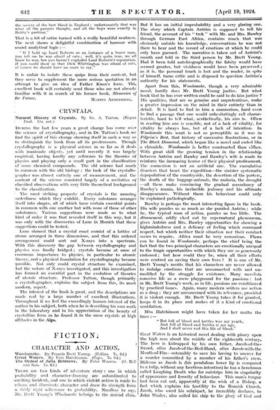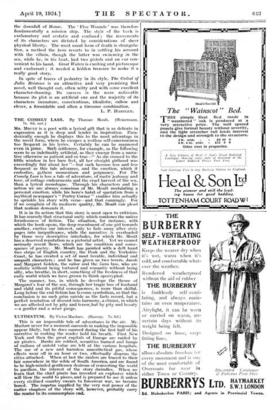FICTION
CHARACTER AND ACTION.
THERE are two kinds of adventure story : one in which probability and character-drawing are subordinated to =exciting incident, and one in-Which 'violent Action' is inide to -release and illruninatc character and draw its strength' from a fairly -rigid adherence to probability. Needless to say, 'Mr. Brett Young's Ifbodyntake bclorigs to the second class. But it has an initial improbability and a very glaring one. The story which Captain Antrim is supposed to tell his friend, the account of his " trek " with Mr. and Mrs. Hawley through German East Africa, contains much that was obviously outside his knowledge, conversations he Was not there to hear and the record of emotions at which he could only have guessed. The narrative is taken out of Antrim's mouth and told in the third person by Mr. Brett Young. Had it been told autobiographically the falsity would have seemed greater, but vividness would have been preserved ; as it is, the personal touch is lost and the reader, in spite of himself, turns critic and is disposed to question Antrim's authority for his statements.
Apart from this, Woodsmoke, though a very admirable novel, hardly does Mr. Brett Young justice. But what book that he has ever written could be said to do him justice ? His qualities, that are so genuine and unpretentious, make a greater impression on the mind in their entirety than in detail. It is hard to find in him a mannerism, hard even to find a passage that one would unhesitatingly call charac- teristic, hard to tell what, aesthetically, his aim is. - Often in reading him one is sensible, not of a lack of vitality, for vitality he always has, - but of a lack of intention. In Woodsmoke this want is not so perceptible as it was in Pilgrim's Rest, that history of successive frustrations, or in The Black Diamond, which began like a novel and ended like a chronicle. Woodsmoke is better constructed than. either. With great skill the growing tension in the relationShip between Antrim and Hawley and Hawley's wife is made to reinforce the increasing horror of their physical predicament. The connexion is not an artificial one. The cumulative disasters that beset the- expedition—the- sinister systematic depopulation- of the countryside, the desertion of the porters, the death of the baggage-animals, the malaria, the drought —all these make convincing the _gradual ascendancy of Rawley's mania, his invincible jealousy and his ultimate disappearance. Without them his behaviour could only be explained- pathologically.
Hawley is perhaps the most interesting figure in the book. His wife puzzles us as much as she' puzzled Antrim ; while he, the typical man of action, puzzles us too little. The denouement, .oddly eked out by supernatural phenomena, gives Antrim and Mrs. -Hawley opportunities for showing a highmindedness and a delicacy of feeling 'which command respect, but which neither their situation nor their conduct seems to require. Africa must be very censorious. - Flaws can be found in Woodsmoke, perhaps the chief being the fact that the two principal characters are emotionally unequal to the tragic opportunities with which they are so generously endowed ; but how could they • be, when all their efforts were centred on saving their own lives ? It is one of Mr. Brett Young's merits that his characters are never allowed to indulge emotions that are unconnected with and un- modified by the struggle for existence. Many novelists conceive life as a mere playground for the passions ; but in Mr. Brett Young's Work, as in life, passions are conditioned 'by practical issues. Again, many modern writers use action as a drug ;• they 'are' unconcerned with' its relevance, provided it is violent enough. Mr. Brett Young takes it for granted, keeps it in its place and makes of it a kind of emotional ventilation.
Miss Hutchinson might have taken for her motto the lines :—
" But full of blood and battles was my youth, And full of blood and -battles is my ago,
And I shall never end this life of blood."
Great Waters is an historical novel dealing with piracy upon the high seas about the middle of the eighteenth century. The hero is kidnapped by his own father, Jacob-of-the- Sword, alias Jacob-of-the-Red-Hand, alias Jacob-with-the Mouth-of-Fire—ostensibly to save his hiving to answer for a murder committed by a member of his father's crew. 'Hideous as' Jacob is (his pendulous lower lip is compared to a tulip, without any facetiousintention) he has a henchman called Laughing Death who far outstrips him in singularity of appearance and ferocity of behaviour. This man's tongue had been cut out, •Upparently at the wish of . a Bishop, a fact which, explains his hostility to the Romish Cbnich. Jacob, who owed his sqbriquet,- he incredibly declares, to John Wesley. -also sailed his ship to the glory of God and
the downfall of Rome. The ' Five Wounds ' was therefore fundamentally a mission ship. The style of the book is exclamatory and ecstatic and confused ; the movements of its characters are dictated by considerations of sheer physical liberty. The most usual form of death is strangula- tion, a method• the hero resorts to in settling his account with the villain, though the latter was swimming in the sea, while he, in his boat, had two pistols and an car con- venient to his hand. Great Waters is exciting and picturesque and exuberant ; it needed a hidden treasure to make it a really good story.
In spite of traces of pedantry in its style, The Ordeal of Tulia Bristowe is an attractive and very promising first novel, well thought out, often witty and with some excellent character-drawing. Its success is the more noticeable because its plot- is an artificial one and the majority of its characters immature, conscientious, idealistic, callow and clever, formidable and often a tiresome combination.
L. P. HARTLEY.



































 Previous page
Previous page